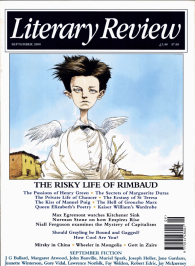Charles Nicholl
Short, Fierce Life of a Homicidal Cupid
Rimbaud
By Graham Robb
Picador 415pp £20
The restless, driven, intensely idiosyncratic life of the poet Arthur Rimbaud reads like a biographer's dream. After a brief and explosive career as the enfant sauvage of French literature, he gives up writing poetry at the age of twenty-one, becomes a drifter, gunrunner and African explorer, and expires painfully and deliriously in a Marseilles hospital at the age of thirty-seven. It is a powerful and tragic story: a modern literary myth. It achieves that status partly because of the extraordinary quality of the poetry Rimbaud wrote in the early 1870s, and partly because his later life seems somehow to pursue the dangerous agendas of the poetry into hard-bitten existential reality. He goes off ‘trafficking in the unknown’ – a resonant phrase from one of his otherwise rather clipped African letters.
But Rimbaud is perhaps more elusive than this lurid synopsis suggests. He is, to say the least, a difficult character to understand or often even to like. He does not need or want anyone trying to ‘make sense’ of him. His abandonment of literature draws a veil of silence over

Sign Up to our newsletter
Receive free articles, highlights from the archive, news, details of prizes, and much more.@Lit_Review
Follow Literary Review on Twitter
Twitter Feed
It wasn’t until 1825 that Pepys’s diary became available for the first time. How it was eventually decrypted and published is a story of subterfuge and duplicity.
Kate Loveman tells the tale.
Kate Loveman - Publishing Pepys
Kate Loveman: Publishing Pepys
literaryreview.co.uk
Arthur Christopher Benson was a pillar of the Edwardian establishment. He was supremely well connected. As his newly published diaries reveal, he was also riotously indiscreet.
Piers Brendon compares Benson’s journals to others from the 20th century.
Piers Brendon - Land of Dopes & Tories
Piers Brendon: Land of Dopes & Tories - The Benson Diaries: Selections from the Diary of Arthur Christopher Benson by Eamon Duffy & Ronald Hyam (edd)
literaryreview.co.uk
Of the siblings Gwen and Augustus John, it is Augustus who has commanded most attention from collectors and connoisseurs.
Was he really the finer artist, asks Tanya Harrod, or is it time Gwen emerged from her brother’s shadow?
Tanya Harrod - Cut from the Same Canvas
Tanya Harrod: Cut from the Same Canvas - Artists, Siblings, Visionaries: The Lives and Loves of Gwen and Augustus John by Judith Mackrell
literaryreview.co.uk